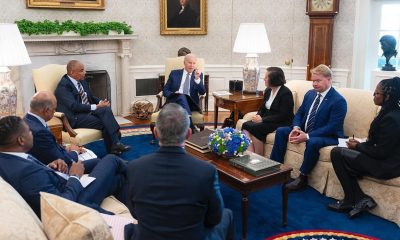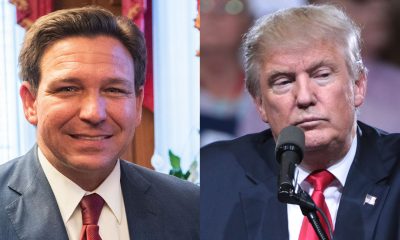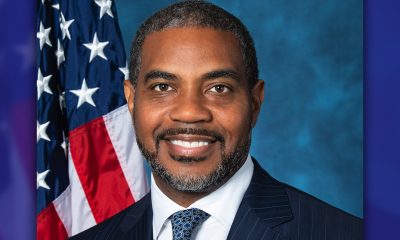World
Cubans to Open Talks About US Fugitives as Ties Warm

A man drives his taxi past a Cultural Center with the word “Cuba” on it, in Havana, Cuba, Tuesday, April 14, 2015. President Barack Obama will remove Cuba from the list of state sponsors of terrorism, the White House announced Tuesday, a key step in his bid to normalize relations between the two countries. (AP Photo/Desmond Boylan)
MICHAEL WEISSENSTEIN, Associated Press
MATTHEW LEE, Associated Press
HAVANA (AP) — The U.S. and Cuba will open talks about two of America’s most-wanted fugitives as part of a new dialogue about law-enforcement cooperation made possible by President Barack Obama’s decision to remove Cuba from a list of state sponsors of terror, the State Department announced Wednesday.
Cuban officials and ordinary citizens alike hailed Obama’s action to remove the island from the list, saying it heals a decades-old insult to national pride and clears the way to swiftly restore diplomatic relations.
State Department spokesman Jeff Rathke said Cuba had agreed to talks about fugitives including Joanne Chesimard, aka Assata Shakur, who was granted asylum by Fidel Castro after she escaped from a U.S. prison where she was serving a sentence for killing a New Jersey state trooper in 1973. The U.S. and Cuba will also discuss the case of William Morales, a Puerto Rican nationalist wanted in connection with bombings in New York in the 1970s.
“We see the reestablishment of diplomatic relations and the reopening of an embassy in Havana as the means by which we’ll be able, more effectively, to press the Cuban government on law enforcement issues such as fugitives. And Cuba has agreed to enter into a law enforcement dialogue with the United States that will work to resolve these cases,” Rathke said. The dialogue is also expected to address cooperation on more routine crimes, officials said.
A Cuban government spokesman did not immediately return calls seeking comment Wednesday, but Josefina Vidal, Cuba’s top diplomat for U.S. affairs, recently ruled out any return of political refugees.
Still she said Tuesday night that “the Cuban government recognizes the president of the United States’ just decision to take Cuba off a list in which it should never have been included.”
Cuban and U.S. foreign-policy experts said the two governments appeared to have taken a major leap toward the reopening of embassies in Havana and Washington after four months of complex and occasionally frustrating negotiations.
“This is important because it speaks to Obama’s desire to keep moving forward,” said Esteban Morales, a political science professor at the University of Havana. “Now there are no political obstacles. What remains are organizational and technical problems, which can be resolved.”
In a message to Congress, Obama said Tuesday that Cuba’s government “has not provided any support for international terrorism” over the last six months and has given “assurances that it will not support acts of international terrorism in the future.”
Cuba will officially be removed from the terrorism list 45 days after the president’s message was sent to Congress. Lawmakers could vote to block the move during that window, though Obama would be nearly certain to veto such a measure.
Rathke said Cuba had also provided assurances that Basque nationalists living in Cuba would never be allowed out to carry out future attacks against Spain.
What remains to be seen is whether Cuba will allow U.S. diplomats to move around Cuba and maintain contacts with citizens including dissidents, the second point of contention in the negotiations on restoring full diplomatic relations.
Cuba is highly sensitive to any indication the U.S. is supporting domestic dissent and that issue could prove considerably tougher than amending the terrorism list. The Obama administration made little pretense in recent years that it believed Cuba was still supporting terrorism.
Cuba was put on the list in 1982 because of what the U.S. said were its efforts “to promote armed revolution by organizations that used terrorism.” That included support for leftist guerrilla groups including the Revolutionary Armed Forces of Colombia and the Basque separatist movement ETA in Spain.
Cuba renounced direct support for militant groups years ago and is sponsoring peace talks between the FARC and Colombia’s government. Spain no longer appears to be actively seeking the return of inactive ETA members who may be in Cuba.
For Cubans, the terrorism list was a particularly charged issue because of the U.S. history of supporting exile groups responsible for attacks on the island, including the 1976 bombing of a Cuban passenger flight from Barbados that killed 73 people aboard. The attack was linked to Cuban exiles with ties to U.S.-backed anti-Castro groups, and both men accused of masterminding the crime took shelter in Florida, where one, Luis Posada Carriles, lives to this day.
“It’s really good that they finally took us off the list even though the reality is that we never should have been there,” said Rigoberto Morejon, a member of the Cuban national fencing team who lost three training partners in the bombing. He added that the hoped “we can keep advancing in the re-establishment of relations.”
Beyond the emotional impact, the terrorism list hobbled Cuba’s ability to do business internationally.
A 1996 law that strips sovereign immunity from nations on the list that engage in extrajudicial killings exposed Cuba to huge judgments in U.S. courts when mainly Cuban-American families accused the Cuban government of responsibility for the deaths of loved ones, said Robert Muse, a Washington-based lawyer who specializes in U.S. law on Cuba.
The perceived and real risks of doing business with a country on the list also made it highly difficult for Cuba to do business with foreign banks. The Cuban Interests Section in Washington has been forced to deal in cash since it lost its bank in the U.S. last year. The ability to reopen a U.S. bank account is one of Cuba’s most urgent demands in the negotiations to reopen embassies. While that decision falls to individual banks, removal from the list will make it easier.
The listing also prevented U.S. representatives at the World Bank and other global financial bodies from approving credit for Cuba, which is increasingly strapped for cash.
Obama’s decision was welcomed on the streets of Havana.
“Finally!” said Mercedes Delgado, a retired accountant. “The door’s opened a little more. That’s always good.”
___
Michael Weissenstein on Twitter: https://twitter.com/mweissenstein
___
Lee reported from Washington. Anne-Marie Garcia in Havana contributed to this report.
Copyright 2015 The Associated Press. All rights reserved. This material may not be published, broadcast, rewritten or redistributed.
Barbara Lee
Congresswoman Barbara Lee Issues Statement on Deaths of Humanitarian Aid Volunteers in Gaza
On April 2, a day after an Israeli airstrike erroneously killed seven employees of World Central Kitchen (WCK), a humanitarian organization delivering aid in the Gaza Strip, a statement was release by Rep. Barbara Lee (D-CA-12). “This is a devastating and avoidable tragedy. My prayers go to the families and loved ones of the selfless members of the World Central Kitchen team whose lives were lost,” said Lee.

By California Black Media
On April 2, a day after an Israeli airstrike erroneously killed seven employees of World Central Kitchen (WCK), a humanitarian organization delivering aid in the Gaza Strip, a statement was release by Rep. Barbara Lee (D-CA-12).
“This is a devastating and avoidable tragedy. My prayers go to the families and loved ones of the selfless members of the World Central Kitchen team whose lives were lost,” said Lee.
The same day, it was confirmed by the organization that the humanitarian aid volunteers were killed in a strike carried out by Israel Defense Forces (IDF). Prior to the incident, members of the team had been travelling in two armored vehicles marked with the WCF logo and they had been coordinating their movements with the IDF. The group had successfully delivered 10 tons of humanitarian food in a deconflicted zone when its convoy was struck.
“This is not only an attack against WCK. This is an attack on humanitarian organizations showing up in the direst situations where food is being used as a weapon of war. This is unforgivable,” said Erin Gore, chief executive officer of World Central Kitchen.
The seven victims included a U.S. citizen as well as others from Australia, Poland, the United Kingdom, Canada, and Palestine.
Lee has been a vocal advocate for a ceasefire in Gaza and has supported actions by President Joe Biden to airdrop humanitarian aid in the area.
“Far too many civilians have lost their lives as a result of Benjamin Netanyahu’s reprehensible military offensive. The U.S. must join with our allies and demand an immediate, permanent ceasefire – it’s long overdue,” Lee said.
Bay Area
Nigerian Bank Chief Killed in Helicopter Crash on Way to Superbowl XVIII
According to the San Bernardino County Sheriff’s Dept., the crash occurred near Nipton, on the edge of the Mojave Desert Preserve. The poor weather conditions — rain, wind and snow showers—may have contributed to the accident, although the investigation is not complete. All six aboard were killed. Herbert Wigwe, 57, founded Access Bank in 1989, and it became the country’s largest competitor, Diamond Bank in 2018.
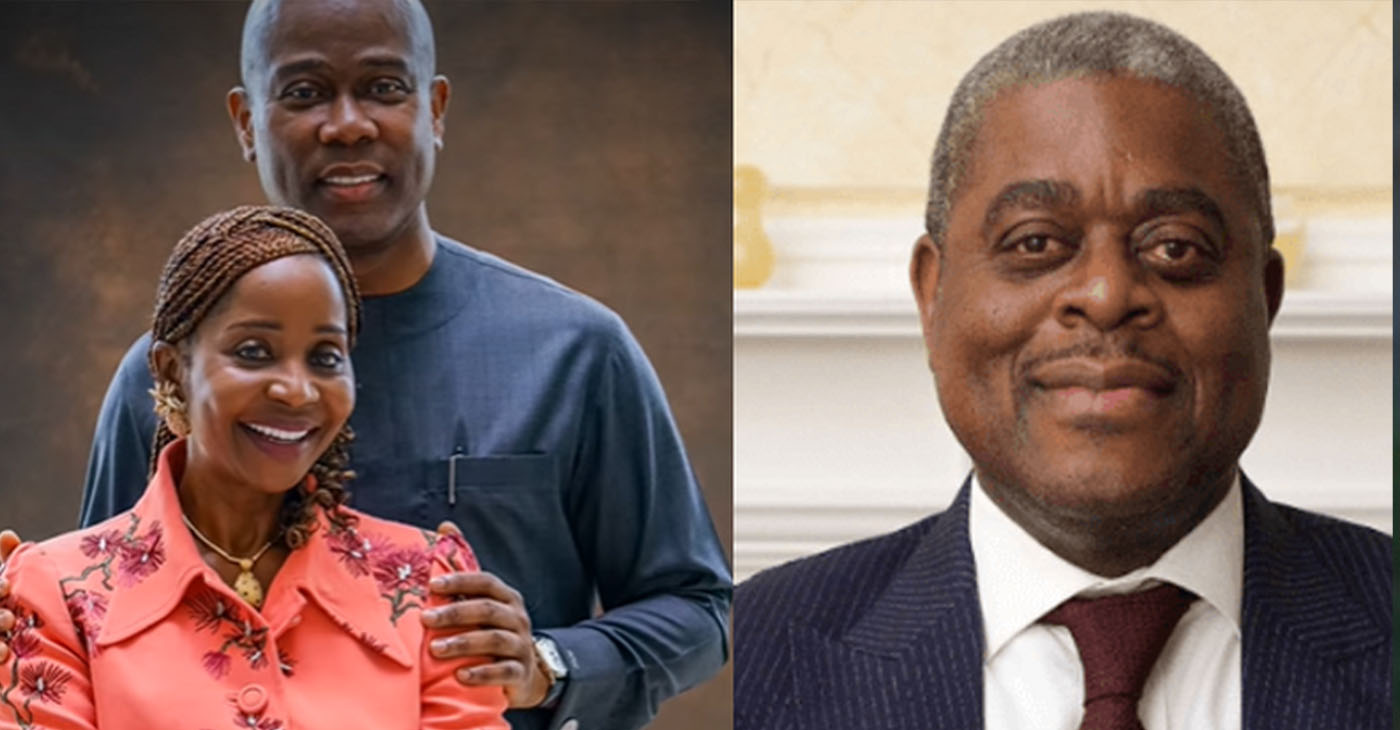
By Post Staff
The co-founder of one of Nigeria’s largest banks died with his wife, son and three others when the helicopter transporting them from Palm Springs, Ca., to Boulder City, Nev. to attend the fifty-eighth SuperBowl at the stadium outside Las Vegas crashed on Feb. 9.
According to the San Bernardino County Sheriff’s Dept., the crash occurred near Nipton, on the edge of the Mojave Desert Preserve. The poor weather conditions — rain, wind and snow showers—may have contributed to the accident, although the investigation is not complete. All six aboard were killed
Herbert Wigwe, 57, founded Access Bank in 1989, and it became the country’s largest competitor, Diamond Bank in 2018.
More recently, Wigwe was planning to open a banking service in Asia this year after making successful expansions to other parts of Africa, including South Africa, Kenya, and Botswana.
Nigerian President Bola Tinubu described Wigwe’s death as an ‘overwhelming tragedy.”
Oakland resident and Nigerian immigrant Kayode Gbadebo agrees with Tinubu. He met Wigwe in Nigeria but crossed paths with him in London in 2006. Wigwe, he said, “took risks.”
He was young and people thought he couldn’t do what he intended, which was not so much about money but community.
“He was more like Jesus in washing the feet of the poor– Wigwe was culturizing community,” Gbadebo said.
“There will never be another like him. This is a deep, deep loss” and he hopes everyone will eventually “be comforted.”
He was also disappointed that a replacement has already been named even before Wigwe is buried. “It is not reasonable. You don’t want a vacuum, but it’s” not fair to the family, Gbadebo observed.
Wigwe had also been working to solve the migration issues from African countries, believing that “investing in higher education was key to controlling mass migration, which “is destabilising countries across the world,” BBC News reported.
“We need to take a holistic approach to address global migration, starting with our traditional framework for international development,” Wigwe wrote.
To that end, according to BBC News, Wigwe was preparing to open Wigwe University in Niger, where he was from.
“The best place to limit migration is not in the middle of the Mediterranean or the English Channel or the Rio Grande. It is in the home countries that so many migrants are so desperate to leave,” he wrote, saying his university was an opportunity for him “to give back to society.”
Besides Wigwe and his wife, Chizoba Nwuba Wigwe, and one son, two crew members and Bimbo Ogunbanjo, former group chairman of the Nigerian Exchange Group Plc, were also killed in the crash.
According to Wikipedia, three other children survive Wigwe.
In his statement reported in People magazine, Tinubu described Wigwe as “a distinguished banker, humanitarian, and entrepreneur.”
“I pray for the peaceful repose of the departed and ask God Almighty to comfort the multitude of Nigerians who are grieving and the families of the deceased at this deeply agonizing moment,” the president said.
He added, “Their passing is an overwhelming tragedy that is shocking beyond comprehension.”
Besides feeling the tremendous loss, Gbadebo fears the disorder and greed that will follow. “It’s a mess,” he said.
People magazine, BBC News and Wikipedia were the sources for this report.
Activism
No Valid Reason for Failing to Condemn Hamas’ Act of Terrorism
On Oct. 7, 2023, Hamas terrorists crossed the Israel-Gaza border and indiscriminately slaughtered Israeli civilians in their homes. They killed nearly 300 young people at a music festival and took at least 200 hostages including 30 children. The atrocities they committed included massacres of families, abduction of the elderly and children, burning of babies and rapes of women.
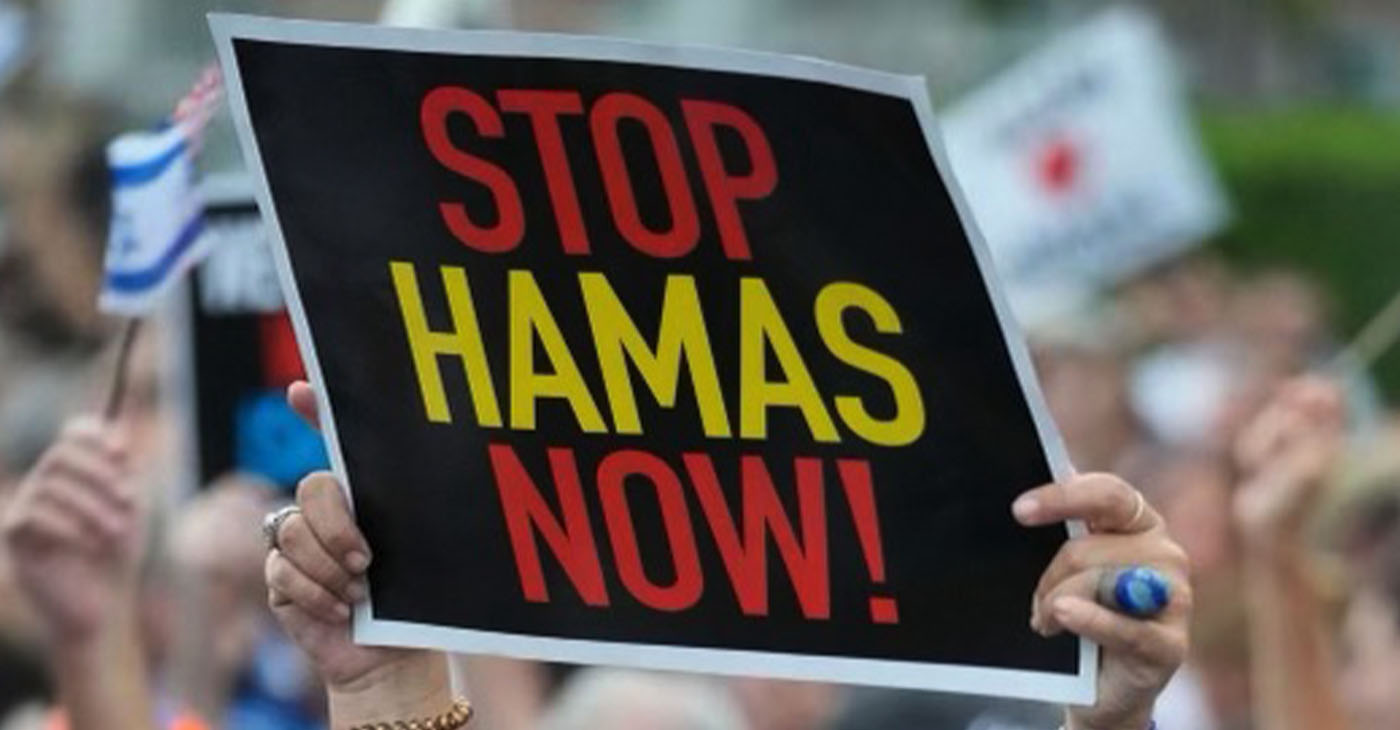
By Joe W. Bowers Jr.
California Black Media
OPINION
On Oct. 7, 2023, Hamas terrorists crossed the Israel-Gaza border and indiscriminately slaughtered Israeli civilians in their homes.
They killed nearly 300 young people at a music festival and took at least 200 hostages including 30 children. The atrocities they committed included massacres of families, abduction of the elderly and children, burning of babies and rapes of women.
The horrific surprise attack deserves universal and unequivocal condemnation. President Joe Biden called what Hamas did “an act of sheer evil” and pledged to defend the lives of Israelis and Jewish Americans.
He said, “Let there be no doubt. The United States has Israel’s back. We’ll make sure the Jewish and democratic state of Israel can defend itself today, tomorrow, as we always have.”
Hamas killed approximately 1,400 people including 32 Americans. Citizens from 40 different countries including the United Kingdom, France, Mexico, and Thailand were killed or reported missing.
Hamas fighters breached Israel’s border defenses on the final day of Sukkot while soldiers were away due to the holiday and launched attacks on 22 towns outside the Gaza Strip. This security lapse has been described as a catastrophic failure of Israel’s intelligence agencies..
Hamas is an extremist Islamist militant organization that has governed the Gaza Strip since 2007. It is recognized as an Iranian-backed terrorist group by the U.S. and the European Union and has a long history of violence against Jews and Palestinians, the latter of whom they often use as human shields.
While there have been plenty of groups who have unequivocally condemned the massacres, there are a number who haven’t, including organizations such as the Democratic Socialists of America (DSA), Black Alliance for Peace, Red Nation, and independent Black Lives Matter (BLM) chapters (excluding the national Black Lives Matter Global Network Foundation).
The DSA San Francisco chapter put out a statement on Oct. 9 that said, “Socialists support the Palestinian people’s, and all people’s, right to resist and fight for their own liberation. This weekend’s events are no different.”
Student organizations at a number of universities and colleges in California signed a solidarity statement titled “Resistance Uprising in Gaza” from Students for Justice in Palestine (SJP). The statement attributes the violence of the Hamas attack to what it refers to as Israeli apartheid and occupation.
The SJP statement written by Bears for Palestine at UC Berkeley says, “We support the resistance, we support the liberation movement, and we indisputably support the Uprising.” Essentially, these students are indirectly associating themselves with Hamas’ barbaric acts under the guise of “resistance.”
Signing the statement were 51 student organizations including those from Stanford, UC Berkeley, UCLA, UC Davis, UC San Diego, CSU Sacramento, and USC.
A statement signed by 34 Harvard student organizations said, “We, the undersigned student organizations, hold the Israeli regime entirely responsible for all unfolding violence.”
Many university leaders, where these students are enrolled, have been guilty of failing to unequivocally condemn Hamas and for inadequately addressing their students’ expressed support for Hamas.
Several Stanford faculty members, including three Nobel laureates, condemned Stanford’s administrators’ weak response to acts of terrorism and the expression of pro-Hamas sentiments by students on campus.
Israel unilaterally withdrew from Gaza in 2005. It dismantled 21 Israeli settlements in the territory and handed them over to the Palestinian Authority.
The assault by Hamas on Oct. 7 was not an ordinary clash with Israel. Hamas’ actions resulted in the deadliest single day for Jews since the Holocaust.
While there are valid reasons for protesting Israel’s treatment of Palestinians and a real reckoning with the Israeli government on its policies is long overdue, nothing justifies Hamas’ attack.
Israelis who were killed largely had nothing to do with the conditions of Palestinians in Gaza. Some of the victims weren’t even Israeli — they were just tourists.
The students blaming Israel for the atrocities committed by Hamas have faced criticism. Some groups have withdrawn their endorsements because of the backlash aimed at them. Others have doubled down on their activism. SJP held a “National Day of Resistance” on several campuses.
Several CEOs have asked Harvard to disclose a list of members from the organizations assigning responsibility to Israel to insure they do not hire any of their members. A Berkeley law professor has also urged firms not to hire his students who have publicly blamed Israel for the war.
This California Black Media report was supported in whole or in part by funding provided by the State of California, administered by the California State Library.
-

 Activism4 weeks ago
Activism4 weeks agoOakland Post: Week of March 27 – April 2, 2024
-

 #NNPA BlackPress4 weeks ago
#NNPA BlackPress4 weeks agoBeloved Actor and Activist Louis Cameron Gossett Jr. Dies at 87
-

 Community1 week ago
Community1 week agoFinancial Assistance Bill for Descendants of Enslaved Persons to Help Them Purchase, Own, or Maintain a Home
-

 Activism3 weeks ago
Activism3 weeks agoOakland Post: Week of April 3 – 6, 2024
-

 Business1 week ago
Business1 week agoV.P. Kamala Harris: Americans With Criminal Records Will Soon Be Eligible for SBA Loans
-

 Activism2 weeks ago
Activism2 weeks agoOakland Post: Week of April 10 – 16, 2024
-

 Community1 week ago
Community1 week agoAG Bonta Says Oakland School Leaders Should Comply with State Laws to Avoid ‘Disparate Harm’ When Closing or Merging Schools
-

 Community6 days ago
Community6 days agoOakland WNBA Player to be Inducted Into Hall of Fame


